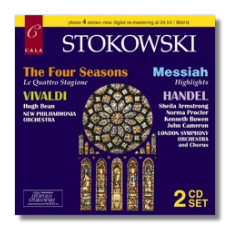
The Internet's Premier Classical Music Source
Related Links
- Latest Reviews
- More Reviews
-
By Composer
-
Collections
DVD & Blu-ray
Books
Concert Reviews
Articles/Interviews
Software
Audio
Search Amazon
Recommended Links
Site News
 CD Review
CD Review
Stokowski and Baroque

- Antonio Vivaldi: The Four Seasons *
- George Frideric Handel: Messiah excerpts
* Hugh Bean, violin
* Charles Spinks, harpsichord
* New Philharmonia Orchestra/Leopold Stokowski
Sheila Armstrong, soprano
Norma Procter, contralto
Kenneth Bowen, tenor
John Cameron, bass
LSO Chorus/John Alldis
London Symphony Orchestra/Leopold Stokowski
CALA CACD0538 2CDs
Stokowski conducted a lot more Baroque music than his Bach transcriptions. These two discs contain the final statements he made in this type of music. His way with the Baroque is not 'historically correct' perhaps… and I stress the perhaps because in the context of the Romantic approach to interpreting classical music this is historically in a context going back to Wagner. There is nothing wrong with imbuing music with feeling.
It is odd that Stokowski had never conducted Vivaldi's "Four Seasons" before this recording, made in 1966. In fact, he 'learned' it just for this occasion. The interpretation is, as said, Romantic. You can hear an antiphonal effect as if there were more than one orchestra involved in the recording. The deep, rich bass, so typical of The Stokowski Sound, underpins proceedings. At the same time there is an earthy feel to the recording a rustic sound. Hugh Bean is a perfect soloist. When the LP was released the reviewer R. D. Darrell wrote in High Fidelity:
"One's first impressions in listening to this new release are of a tautly controlled, beautifully played performance surprisingly free of the familiar Stokowskian stylistic traits. But as one listens again, there are unmistakable indications that the Old Adam can't be completely denatured… Stokowski achieves an (excellent) balance between soloist and orchestra, and his harpsichordist has been recorded with the loveliest, least jangly, plucked-string qualities I think I've ever heard… Mildly romanticized and slightly oversize though Stokowski's Seasons may be, it's doubtful whether the work has ever sounded better."
The Messiah excerpts are equally romantically interpreted and played. The soloists are all excellent and the London Symphony certainly sounds as if it is not reduced in size. Then, too, a work of this nature inherently calls for a full-treatment. On hearing this release, Norma Procter wrote to Ed Johnson, "Many thanks for the CD – which has made an excellent transfer from the original LP – wonderful tone colours & typical Stokowski!… Many congratulations and bravo… also to all involved in this very fine transfer – I hope it will be a great and resounding success." (No pun intended I assume).
The contents on this release were originally released in the U.S. of A on the 'Weekend Classics' series. The "Messiah" excerpts were on 433874-2 whilst the "Four Seasons" was on 433680-2 coupled with two other concertos played by the Moscow Chamber Orchestra with Rudolph Barshai (which made for a weird listening experience). For some of you this may mean duplication if you already have these issues. Two factors, however, need to be considered. First, is the quality of the sound better? The previous CDs had a thin string sound and the bass was simply not there. You couldn't really hear the harpsichordist (Charles Spinks also played it on the Messiah recording). In fact taking notes as I listened to that disc years ago, I wrote, "Harpsichord?" because I wasn't sure if I heard one. That is, this release is not only better sounding but also better represents The Stokowski Sound. The second reason is because you are helping to support the Leopold Stokowski Society and people who appreciate Stokowski's magic must needs support the society that is working, successfully, to promote his legacy.
Finally, you get both discs for the price of one! Strongly recommended.
Copyright © 2004, Robert Stumpf II













